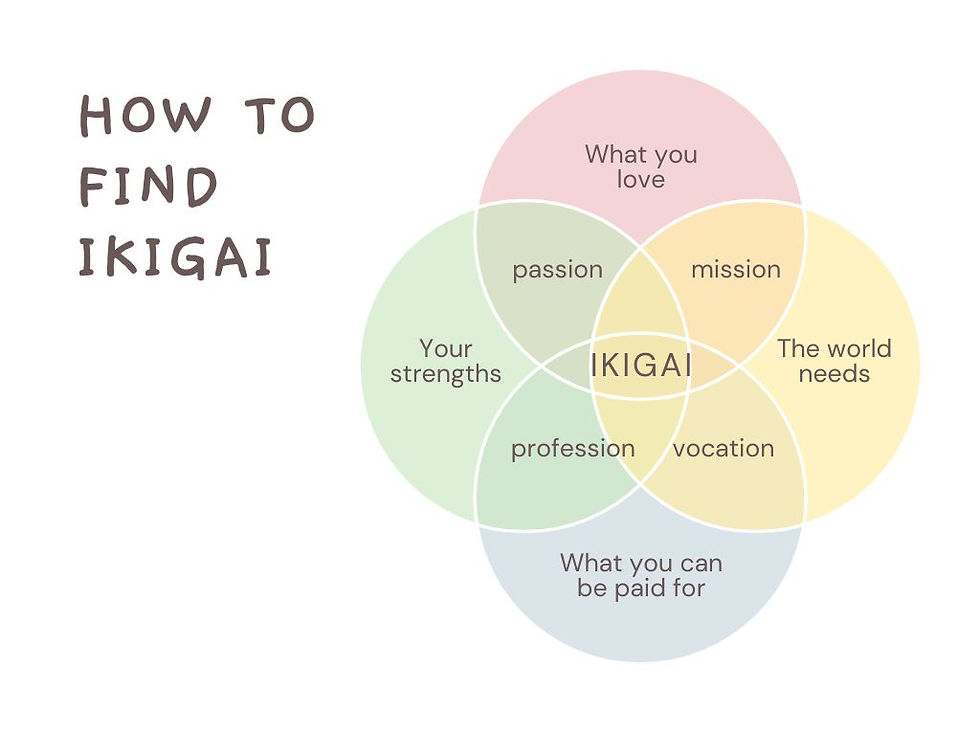How to Find Purpose and Meaning at Work: Discover Your Ikigai
- Dr. Jeff Doolittle

- Dec 16, 2024
- 4 min read

Employees want more meaningful and purposeful work. Few experience happiness or commitment in the workplace. Research indicates that only two in ten U.S. employees are satisfied with their place of work. Despite this, 71% of executives recognize an engaged workforce is critical to a company's success. You're not alone if you are on a quest for the perfect career or feel stuck in a rut. A recent study found that nearly three in ten employees are looking for a new job in the new year. However, the best solution for many may not be found in switching positions or companies. There's a saying that if you don't know where you're going, any road will take you there. Discovering purpose and meaning at work begins with a clear picture of what it looks like rather than simply thinking, "Anything but this." Here is what you need to know about an ancient Japanese concept called ikigai and three steps to finding purpose and meaning at work.
Starting with the end in mind matters
Career fulfillment and satisfaction are found in balancing your passions, skills, and interests. It is a positive response to an actual or felt satisfaction of needs, desires, or aspirations.
Athletes are trained to visualize themselves successfully achieving their goals before events. Numerous scientific studies link creative visualization (the ability to start with the end in mind) to improved performance, goal achievement, and stress management. Research supports that beginning with the end in mind through creative practice boosts your confidence and competence.
Here is a short video on the concept of mental imagery used by athletes.
Ikigai (e-key-guy) is a Japanese concept dating back to 794 AD that refers to your direction or purpose in life, providing fulfillment, satisfaction, and a sense of meaning. The literal translation consists of two words, 'iki' meaning to live and 'gai' meaning reason.
Evidence suggests that the positive psychological effects of ikigai include:
professional success
well-being
academic success
physical benefits such as longevity of life
Evidence from a study of over 40,000 adults found that both men and women with ikigai had a decreased risk of death from external causes.
Visualizing your ikigai/career fulfillment
Clarifying your ikigai unlocks the ability to visualize success (career fulfillment and satisfaction). Here is a short video on the meaning of ikigai. The key to understanding your professional ikigai is to explore the following four questions:
What do you love to do?
What does the world need?
What can you get paid for?
What are your strengths?
The intersection points of these four questions help you clarify your passion (love and good at), mission (love and world needs), vocation (world needs and paid for), and profession (paid for and good at).

The busyness of a fast-paced digital world has a way of keeping us from achieving our life's goals. Although this concept may appear straightforward, the value lies in the hard work of uncovering your answers to each of the four questions. Here are three steps to clarify your picture of career fulfillment:
Finding Purpose and Meaning Step #1: Ask Yourself
This is a potentially obvious point, but crucial. Planning is often the most significant barrier to reflection. You get too busy or distracted and move on to the next thing before reflecting. It doesn't have to be long, but I recommend scheduling at least 20 minutes in a quiet place. Then, ask yourself each question and journal what comes to your mind. Don't filter. Just write it down. Remember that discovering your answers to these questions is a journey rather than a one-time process.
Finding Purpose and Meaning Step #2: Ask Others
Find a few people who know you well, that you trust, and will be encouraging. Ask them how they would answer the questions for you. Consider hiring an executive coach. An effective executive coach will challenge assumptions and views and encourage, stretch, and challenge you. Coaching is a thought-provoking and creative process that inspires clients to maximize their personal and professional potential.
Finding Purpose and Meaning Step #3: Reflect
Reflect on what you heard. Consider themes rather than specific points shared and, as needed, edit or delete points you journaled. Once you understand your ikigai well, you can use the four questions and a simple Likert rating scale, where one is low, and five is high, to score every professional opportunity you might be considering along with your current work. The higher the score, the higher the alignment with your ikigai.
References:
Garcia, H. & Miralles, F. (2018). Ikigai: The Japanese secret to a long and happy life. Penguin Life.
Personio (2021). Counting the cost: How businesses risk a post-pandemic talent drain.
Schippers, M., & Ziegler, N. (2019). Life crafting is a way to find purpose and meaning in life. Frontiers in Psychology, 10, 2778-2778.
Tanno, K., Sakata, K., Ohsawa, M., Onoda, T., Itai, K., Yaegashi, Y., Tamakoshi, A., for JACC Study Group, & JACC Study Group. (2009). Associations of ikigai as a positive psychological factor with all-cause mortality and cause-specific mortality among middle-aged and elderly Japanese people: Findings from the Japan collaborative cohort study. Journal of Psychosomatic Research, 67(1), 67-75.
U.S. Bureau of Labor Statistics. (2021). Job openings and labor turnover summary. Economic News Release.









Comments